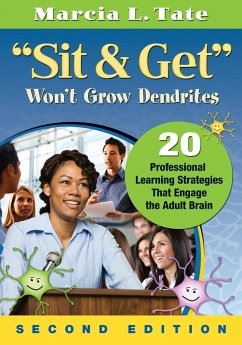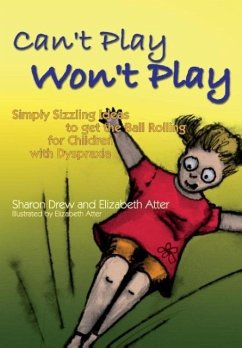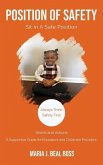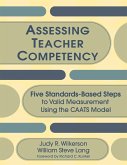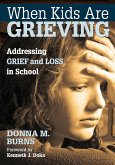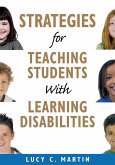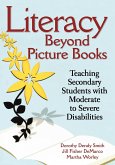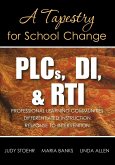Marcia L. Tate
Sit and Get Won't Grow Dendrites
20 Professional Learning Strategies That Engage the Adult Brain
Marcia L. Tate
Sit and Get Won't Grow Dendrites
20 Professional Learning Strategies That Engage the Adult Brain
- Broschiertes Buch
- Merkliste
- Auf die Merkliste
- Bewerten Bewerten
- Teilen
- Produkt teilen
- Produkterinnerung
- Produkterinnerung
Make professional development unforgettable Teaching busy adults can be a daunting task. How do you grab their attention and make material memorable? Expert Marcia Tate knows how adults learn best and shares 20
Andere Kunden interessierten sich auch für
![Can't Play Won't Play Can't Play Won't Play]() Sharon DrewCan't Play Won't Play24,99 €
Sharon DrewCan't Play Won't Play24,99 €![Position of Safety, Sit In A Safe Position Position of Safety, Sit In A Safe Position]() Maria J Beal RossPosition of Safety, Sit In A Safe Position16,99 €
Maria J Beal RossPosition of Safety, Sit In A Safe Position16,99 €![Assessing Teacher Competency Assessing Teacher Competency]() Judy R. WilkersonAssessing Teacher Competency48,99 €
Judy R. WilkersonAssessing Teacher Competency48,99 €![When Kids Are Grieving When Kids Are Grieving]() Donna M. BurnsWhen Kids Are Grieving34,99 €
Donna M. BurnsWhen Kids Are Grieving34,99 €![Strategies for Teaching Students with Learning Disabilities Strategies for Teaching Students with Learning Disabilities]() Lucy C. MartinStrategies for Teaching Students with Learning Disabilities39,99 €
Lucy C. MartinStrategies for Teaching Students with Learning Disabilities39,99 €![Literacy Beyond Picture Books Literacy Beyond Picture Books]() Dorothy Dendy SmithLiteracy Beyond Picture Books43,99 €
Dorothy Dendy SmithLiteracy Beyond Picture Books43,99 €![PLCs, DI, & RTI PLCs, DI, & RTI]() Judy StoehrPLCs, DI, & RTI41,99 €
Judy StoehrPLCs, DI, & RTI41,99 €-
-
-
Make professional development unforgettable Teaching busy adults can be a daunting task. How do you grab their attention and make material memorable? Expert Marcia Tate knows how adults learn best and shares 20
Hinweis: Dieser Artikel kann nur an eine deutsche Lieferadresse ausgeliefert werden.
Hinweis: Dieser Artikel kann nur an eine deutsche Lieferadresse ausgeliefert werden.
Produktdetails
- Produktdetails
- Verlag: Corwin
- Seitenzahl: 192
- Erscheinungstermin: 20. Juni 2012
- Englisch
- Abmessung: 254mm x 178mm x 11mm
- Gewicht: 373g
- ISBN-13: 9781412999342
- ISBN-10: 1412999340
- Artikelnr.: 35211509
- Herstellerkennzeichnung
- Libri GmbH
- Europaallee 1
- 36244 Bad Hersfeld
- gpsr@libri.de
- Verlag: Corwin
- Seitenzahl: 192
- Erscheinungstermin: 20. Juni 2012
- Englisch
- Abmessung: 254mm x 178mm x 11mm
- Gewicht: 373g
- ISBN-13: 9781412999342
- ISBN-10: 1412999340
- Artikelnr.: 35211509
- Herstellerkennzeichnung
- Libri GmbH
- Europaallee 1
- 36244 Bad Hersfeld
- gpsr@libri.de
Marcia L. Tate, EdD, is the former executive director of professional development for the DeKalb County School System in Decatur, Georgia. During her thirty-year career with the district, she has been a classroom teacher, reading specialist, language arts coordinator, and staff development executive director. Marcia is currently an educational consultant and has taught over 500,000 administrators, teachers, parents, and business and community leaders throughout the world. She is the author of the eight books in the best-selling Worksheets Don't Grow Dendrites series and four additional books: Formative Assessment in a Brain-Compatible Classroom: How Do We Really Know They're Learning?, 100 Brain-Friendly Lessons for Unforgettable Teaching and Learning K-8, and 100 Brain-Friendly Lessons for Unforgettable Teaching and Learning 9-12, and her latest book, Healthy Teachers, Happy Classrooms that is designed to address both the personal and professional lives of all educators. Participants in her workshops refer to them as some of the best ones they have ever experienced since Marcia uses the twenty strategies outlined in her books to actively engage her audiences. Marcia received her bachelor's degree in psychology and elementary education from Spelman College in Atlanta, Georgia. She earned her master's degree in remedial reading from the University of Michigan in Ann Arbor, her specialist degree in educational leadership from Georgia State University, and her doctorate in educational leadership from Clark Atlanta University. Marcia is married to Tyrone Tate and is the proud mother of three children: Jennifer, Jessica, and Christopher, and nine grandchildren: Christian, Aidan, Maxwell, Aaron, Roman, Shiloh, Aya, Noah, and Alyssa. Marcia and her husband own the company Developing Minds, Inc. and can be contacted by calling the company at (770) 918-5039, emailing her at marciata@ bellsouth.net, or by visiting her website at www.developingmindsinc.com. You can also follow her on Twitter and Instagram at @DrMarciaTate.
Preface
Acknowledgments
About the Author
Introduction: Adult Learning Theory
1. Brainstorming and Discussion
2. Drawing and Artwork
3. Field Trips
4. Games
5. Graphic Organizers, Semantic Maps, and Word Webs
6. Humor and Celebration
7. Manipulatives and Models
8. Metaphors, Analogies, and Similes
9. Mnemonic Devices
10. Movement
11. Music, Rhythm, Rhyme, and Rap
12. Project-Based and Problem-Based Instruction
13. Reciprocal Teaching, Cooperative Learning, and Peer Coaching
14. Role Plays, Drama, Pantomimes, and Charades
15. Storytelling
16. Technology
17. Visualization and Guided Imagery
18. Visuals
19. Work Study, Action Research, and Professional Learning Communities
20. Writing and Reflection
Resource A: Professional Learning Lesson Design
Resource B: Sample Professional Learning Lesson Designs
Resource C: Tips for Making Your Professional Learning Unforgettable
Resource D: Secrets for Looking Younger, Staying Healthier, and Living
Longer
Bibliography
Index
Acknowledgments
About the Author
Introduction: Adult Learning Theory
1. Brainstorming and Discussion
2. Drawing and Artwork
3. Field Trips
4. Games
5. Graphic Organizers, Semantic Maps, and Word Webs
6. Humor and Celebration
7. Manipulatives and Models
8. Metaphors, Analogies, and Similes
9. Mnemonic Devices
10. Movement
11. Music, Rhythm, Rhyme, and Rap
12. Project-Based and Problem-Based Instruction
13. Reciprocal Teaching, Cooperative Learning, and Peer Coaching
14. Role Plays, Drama, Pantomimes, and Charades
15. Storytelling
16. Technology
17. Visualization and Guided Imagery
18. Visuals
19. Work Study, Action Research, and Professional Learning Communities
20. Writing and Reflection
Resource A: Professional Learning Lesson Design
Resource B: Sample Professional Learning Lesson Designs
Resource C: Tips for Making Your Professional Learning Unforgettable
Resource D: Secrets for Looking Younger, Staying Healthier, and Living
Longer
Bibliography
Index
Preface
Acknowledgments
About the Author
Introduction: Adult Learning Theory
1. Brainstorming and Discussion
2. Drawing and Artwork
3. Field Trips
4. Games
5. Graphic Organizers, Semantic Maps, and Word Webs
6. Humor and Celebration
7. Manipulatives and Models
8. Metaphors, Analogies, and Similes
9. Mnemonic Devices
10. Movement
11. Music, Rhythm, Rhyme, and Rap
12. Project-Based and Problem-Based Instruction
13. Reciprocal Teaching, Cooperative Learning, and Peer Coaching
14. Role Plays, Drama, Pantomimes, and Charades
15. Storytelling
16. Technology
17. Visualization and Guided Imagery
18. Visuals
19. Work Study, Action Research, and Professional Learning Communities
20. Writing and Reflection
Resource A: Professional Learning Lesson Design
Resource B: Sample Professional Learning Lesson Designs
Resource C: Tips for Making Your Professional Learning Unforgettable
Resource D: Secrets for Looking Younger, Staying Healthier, and Living
Longer
Bibliography
Index
Acknowledgments
About the Author
Introduction: Adult Learning Theory
1. Brainstorming and Discussion
2. Drawing and Artwork
3. Field Trips
4. Games
5. Graphic Organizers, Semantic Maps, and Word Webs
6. Humor and Celebration
7. Manipulatives and Models
8. Metaphors, Analogies, and Similes
9. Mnemonic Devices
10. Movement
11. Music, Rhythm, Rhyme, and Rap
12. Project-Based and Problem-Based Instruction
13. Reciprocal Teaching, Cooperative Learning, and Peer Coaching
14. Role Plays, Drama, Pantomimes, and Charades
15. Storytelling
16. Technology
17. Visualization and Guided Imagery
18. Visuals
19. Work Study, Action Research, and Professional Learning Communities
20. Writing and Reflection
Resource A: Professional Learning Lesson Design
Resource B: Sample Professional Learning Lesson Designs
Resource C: Tips for Making Your Professional Learning Unforgettable
Resource D: Secrets for Looking Younger, Staying Healthier, and Living
Longer
Bibliography
Index

